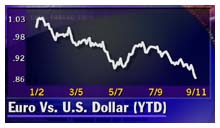|
Euro dips; no limit in sight
|
 |
September 11, 2000: 1:08 p.m. ET
Europe's single currency hits record low; analysts forecast bleak future
By Gordon Platt
|
NEW YORK (CNNfn) - How low will the euro go? Traders keep trying to pick a bottom for Europe's single currency, and they keep getting burned.
The euro sank to another record low of 85.70 cents Monday, and analysts are uniformly bearish on its prospects in the weeks and months ahead.
The most likely scenario is a further euro decline over the next one to three months, as investors scale back their long euro holdings, analysts at Chase Securities said.
"We imagine that the euro will become attractive to investors somewhere below 80 cents, and we would certainly buy the currency at 75 cents," they said.
However, because European growth is expected to moderate next year, while the U.S. economy is likely to enjoy continued strength, the Chase analysts do not expect a strong euro rally anytime in the next 12 months.
"There are long-term investors who are still long in euros, sitting with bad positions, and they are continuing to be forced out," said David Solin, partner at Foreign Exchange Analytics, Essex, Conn.
 "The euro will go still lower, but we are unlikely to see a repeat of the wholesale sell-off that occurred last week," Solin said. "The euro will go still lower, but we are unlikely to see a repeat of the wholesale sell-off that occurred last week," Solin said.
The euro was trampled last week as investors fled the currency after
German Chancellor Gerhard Schroeder said the weak euro is good for exports. Last week's 4 percent drop in the euro's value and its continued weakness are sparking speculation that the European Central Bank may need to buy euros to put an end to the mauling.
"I think the possibility of intervention is very small," Solin said. "Apart from the surge in the price of oil, Germany doesn't really have an inflation problem," he said.
Bob Lynch, currency strategist at BNP Paribas, said, "ECB intervention to support the euro is not all that likely."
Click here for the latest market news from CNNfn.com.
Click here for the latest currency rates.
Chancellor Schroeder's comments last week increased speculation that the central bank and the politicians have different policy objectives, Lynch said.
"When all is said and done, however, I think they both want a stable currency, but can't get that message across," he said.
Euro expected to remain soft
Lynch said the euro likely will remain soft for some time, but there will be periods of short-term consolidation. "The market is still biased to sell the currency on any upticks," he said.
The markets are not disorderly, although on an occasional day or two, the declines have been quite large, he said.
The Bank of Japan, however, is much more likely to intervene to keep the yen from rising so strongly against the euro, Lynch said. The Japanese government is concerned that the strong yen will crimp the country's exports and dampen its economic recovery.
"The rise in the yen is becoming more problematic," Lynch said. "Japan's big insurance companies hold substantial amounts of euro-denominated debt, and the weak euro creates a problem for investors," he said.
Analysts at Chase Securities ruled out coordinated intervention to stop the euro's decline. The euro's rout has not been destabilizing to financial markets, they said. What's more, the United States will be unwilling to send a policy signal of that sort during an election year, they added.
Hence, the decline in the euro will have to be self-correcting, they said. The euro will continue to fall until it reaches a level that is attractive to investors.
Carl B. Weinberg, chief economist at High Frequency Economics, Valhalla, N.Y., said, "We see a potentially self-reinforcing cycle developing here, making the euro cheaper the further and faster it declines."
Euro zone investors will keep sending money to North America's capital markets for safe haven, Weinberg said. "This will dent Euroland equities, but New York should benefit," he said.
Dollar up on strong growth, moderate inflation
Analysts said the dollar continues to reign supreme, supported by a favorable combination of strong growth and moderate inflation. Now that the euro has broken through the old lows, they anticipate an adjustment in investor positions that could take the currency sharply lower.
August U.S. economic reports to be released this week are unlikely to tarnish the dollar's shine. Both the producer price index, due Thursday, and the consumer price index Friday are expected to show a moderate increase of 0.2 percent. August retail sales, scheduled for Thursday release, are expected to rise 0.2 percent, following the 0.7 percent surge in July.
"We expect a softer tone to the data after the weakness in the August employment report," Lynch of BNP Paribas said. "But this should not be interpreted as bad for the dollar," he said. "Rather, it should be seen as more opportunity for a soft landing." 
-- Gordon Platt is a freelance columnist writing about currency markets for CNNfn.com
|
|
|
|
|
 |

|

